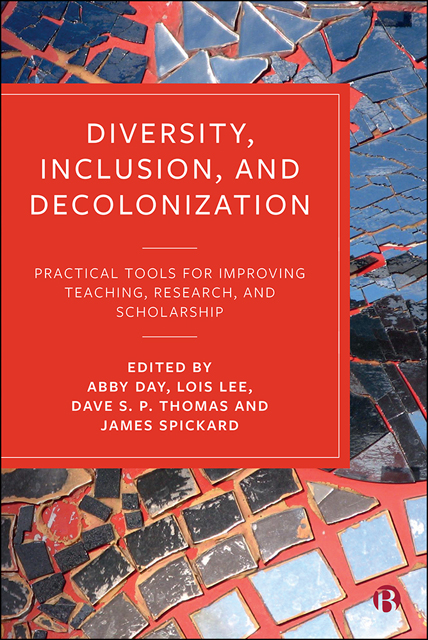 Diversity, Inclusion, and Decolonization
Diversity, Inclusion, and Decolonization Book contents
- Frontmatter
- Contents
- List of Figures and Tables
- Notes on Contributors
- Acknowledgements
- Typographical Note
- Introduction: Why Diversity, Inclusion, and Decolonization Matter
- Part I Changing Universities
- Part II Diversifying Curricula
- Part III Diversifying Research and Scholarship
- Part IV Overcoming Intellectual Colonialism
- Epilogue: What We Have Learned
- Index
7 - Pluralised Realities: Reviewing Reading Lists to Make Them More Culturally Sensitive
Published online by Cambridge University Press: 13 October 2022
- Frontmatter
- Contents
- List of Figures and Tables
- Notes on Contributors
- Acknowledgements
- Typographical Note
- Introduction: Why Diversity, Inclusion, and Decolonization Matter
- Part I Changing Universities
- Part II Diversifying Curricula
- Part III Diversifying Research and Scholarship
- Part IV Overcoming Intellectual Colonialism
- Epilogue: What We Have Learned
- Index
Summary
The aim of creating distance in relation to the Eurocentric tradition is to open analytical spaces for realities that are ‘surprising’ because they are new or have been ignored or made invisible, that is, deemed non-existent by the Eurocentric critical tradition … keeping distance does not mean discarding the rich Eurocentric critical tradition and throwing it into the dustbin of history. … It means including it in a much broader landscape of epistemological and political possibilities. It means exercising hermeneutics of suspicion regarding its ‘foundational truths’ by uncovering what lies below their ‘face value’. It means giving special attention to the suppressed or marginalized smaller traditions within the big Western tradition. (De Sousa Santos, 2014, p 44)
True global history is only possible to the extent that both Ethnocentrism and Eurocentric anti-Eurocentrism, both Occidentalism and orientalism are superseded. Such history is more accurate on the epistemological level and more progressive on the social, political and cultural. Only this kind of history will allow the world to recognize itself in its infinite diversity. (Jack Goody, as cited in De Sousa Santos, 2014, p 100)
Introduction
Most Westerners think that the world’s first university was founded in Bologna in 1088 CE. They are wrong, Al-Qarawiyyin University in Fes el-Bali, Morocco, was founded 170 years earlier, in 859, by Fatima al-Fihri. UNESCO (nd) considers it the oldest existing, continuously operating, degree-granting university in the world. Its library housed a huge collection of manuscripts, including a 9th-century Qur’an. It taught medicine, mathematics, English literature, and Maliki law (one of the four schools of Islamic jurisprudence), plus many other subjects. Nalanda University in India was established even earlier, in 415 CE. It provides the first example of what we now think of as university-level higher education (Bhattacharyya and Guha, 2018). Gundishapur University in Iran (531 CE– 832 CE) was the most important medical centre and higher learning institution in the world during the 6th and 7th centuries (Azizi, 2008), with a pivotal role in the history of mathematics as well as a teaching speciality of philosophy, architecture, and geometry; the library had 259 rooms and contained approximately 400,000 books (Zamiri, 1995, p 64).
- Type
- Chapter
- Information
- Diversity, Inclusion, and DecolonizationPractical Tools for Improving Teaching, Research, and Scholarship, pp. 110 - 124Publisher: Bristol University PressPrint publication year: 2022


